Worldcoin: What It Is And How It Works
In an era where cryptocurrencies emerge and vanish daily, the emergence of Worldcoin sparked numerous discussions. But what exactly is Worldcoin? In this comprehensive guide, we will explore this novel project developed by the creators of OpenAI.
What Is Worldcoin?
Worldcoin is a cryptocurrency created by OpenAI former CEO and co-founder Sam Altman and Alex Blania. Founded in 2019, Worldcoin's mission is to establish a financial network and identity system that would be accessible to all, empowering individuals with ownership.
Alongside this core aim, Worldcoin aspired to achieve several other significant goals. These included enhancing economic opportunities, implementing a dependable solution to differentiate between humans and AI in the digital realm while ensuring privacy protection, enabling global democratic processes, and ultimately presenting a potential pathway towards AI-funded Universal Basic Income (UBI).
| PROPERTY | VALUE |
|---|---|
| 🦄 Symbol | WLD |
| 🚫 Initial Coin Offering (ICO) Price | 75% community and rest development & investors, large pre-mine |
| 🌐 Platform | Ethereum Network (ERC-20 token) |
| ⛏️ Consensus | Worldcoin uses Proof of Stake (PoS) |
| 💰 Total Supply | Capped at 10 billion tokens for 15 years |
| 💰 Circulating Supply | ~10 million WLD (as of July 2023) |
| 💸 Use Case | Worldcoin aims to provide a Universal Basic Income (UBI) using its cryptocurrency token (WLD) and utilizes iris scans for identity verification. Additionally, it offers grants to eligible users, encouraging early adoption and participation in the project |
| 🔥 Token Burn | N/A (Worldcoin does not have a token burn mechanism) |
How Worldcoin Works
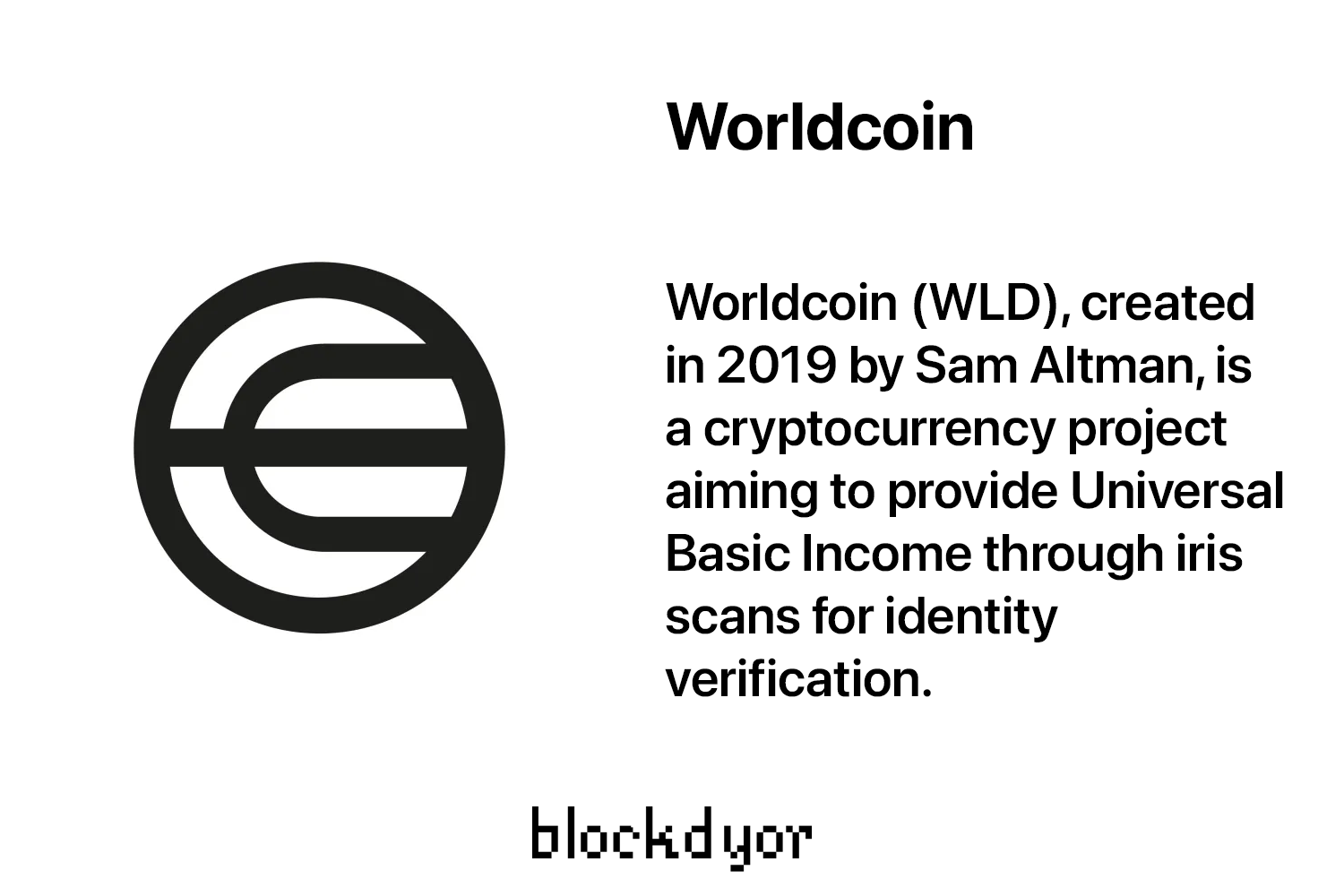
Worldcoin is a cryptocurrency project that aims to incentivize users to sell their biometric data, specifically their eye scans or iris scans, in exchange for the Worldcoin (WLD) cryptocurrency.
As said previously, the project is associated with Sam Altman. The creator of generative artificial intelligence ChatGPT software, has been criticized for his involvement in other ventures and investments that some consider harmful to society.
Here's how Worldcoin works:
- Biometric Data Collection: Worldcoin collects biometric data, primarily iris scans, from individuals using advanced cameras and sensors within their high-tech orb devices. These orbs also capture high-resolution images of users' bodies, faces, and eyes, including their irises. The data consent form also mentions contactless Doppler radar detection of vital signs like heartbeat and breathing (although Worldcoin claims not to have implemented this feature).
- Crypto Reward: Users who participate by allowing their biometric data to be scanned and collected are rewarded with Worldcoin tokens. These tokens are of the ERC-20 standard, meaning they are built on the Ethereum blockchain.
- Wealth Disparity: One of the criticisms of Worldcoin is that it allows wealthy individuals, to exploit people from developing countries. The project targeted poor individuals in these regions to participate in the data collection process.
- Mass Data Collection: Worldcoin's approach involves amassing an extensive database of human biometric data, potentially becoming one of the largest collections of its kind. Critics argue that this poses privacy and security risks, as biometric data is difficult to change compared to usernames and passwords.
- Pre-mine and Market Manipulation: Worldcoin had a significant pre-mine of its tokens, and only a small percentage of the total supply was initially released for trading. This allowed them to create an artificially large market cap, misleading potential investors.
- Concerns about Centralization: The project's data is managed by a centralized, non-profit entity, raising concerns about the control and security of sensitive personal information.
- Proof of Personhood: Worldcoin has been promoted as a way to establish "proof of personhood" to distinguish humans from AI entities. Critics argue that this concept could lead to a digital prison where individuals need to prove their humanity to access basic necessities and services.
- Bitcoin as an Alternative: Critics emphasize the importance of Bitcoin as a decentralized cryptocurrency that provides monetary control and self-sovereignty to individuals, countering the potential risks associated with projects like Worldcoin.
Worldcoin has faced significant criticism for its data collection practices, concerns about privacy and security, and the potential for further wealth disparity and centralization.
Critics argue that projects like Bitcoin offer a more secure and decentralized alternative for individuals seeking to maintain control over their financial and personal data.
Worldcoin Orb
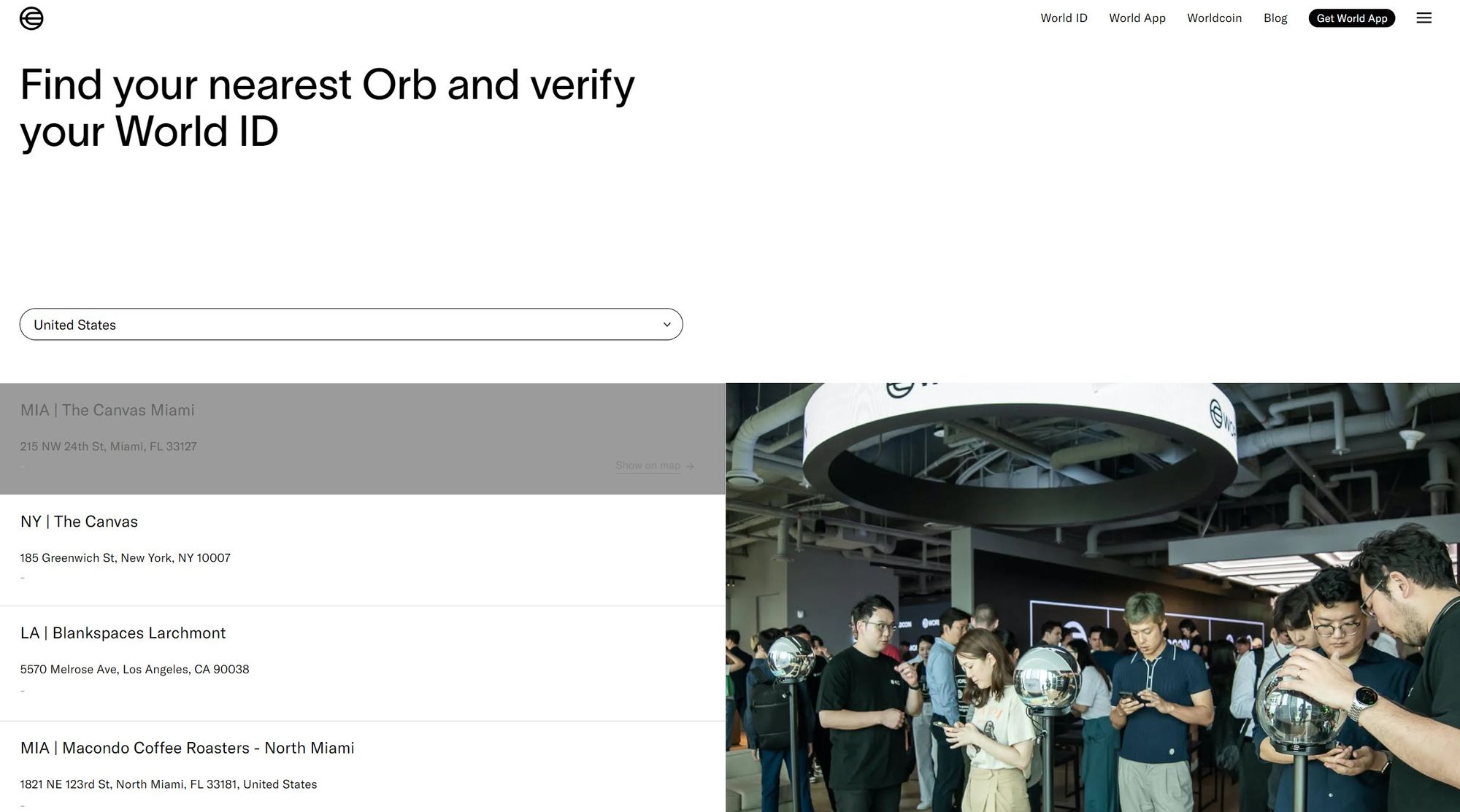
Worldcoin's hardware device, The Orb, was designed by Thomas Meyerhoffer, a former Apple designer of the Steve Jobs era. The Orb is essentially a tool used for scanning and recording users' irises.
The purpose of The Orb is to convert the biometric image of the iris into a highly secure string of numbers, known as an IrisCode. This IrisCode, when combined with an algorithm, serves as a unique identifier for each individual, verifying their identity as a distinct human being. This verification process takes place through a corresponding app on the user's phone.
Worldcoin has manufactured approximately 1,500 of these Orb devices and plans to produce more. The company is offering the Orb service in several cities worldwide, including prominent locations like New York, Barcelona (Spain), London (UK).
Since Worldcoin launched, proof of personhood demand has surged. On average, a unique human is now verifying their World ID every 7.6 seconds & new records are being set daily.
— Worldcoin (@worldcoin) July 28, 2023
Thank you for your patience with the project as more work is done to better meet worldwide demand. pic.twitter.com/gPmr0oQWCR
Additionally, Worldcoin is conducting a tour with The Orb, organizing pop-up sites in various places where interested individuals can access the device. A list of locations where The Orb is available can be found on Worldcoin's official website.
It is important to note that The Orb's primary function revolves around collecting biometric data, specifically iris scans, which has raised privacy and security concerns among critics. While Worldcoin claims to convert this data into a secure form, critics argue that such extensive biometric data collection can have significant privacy implications and potential risks if misused or compromised.
World ID
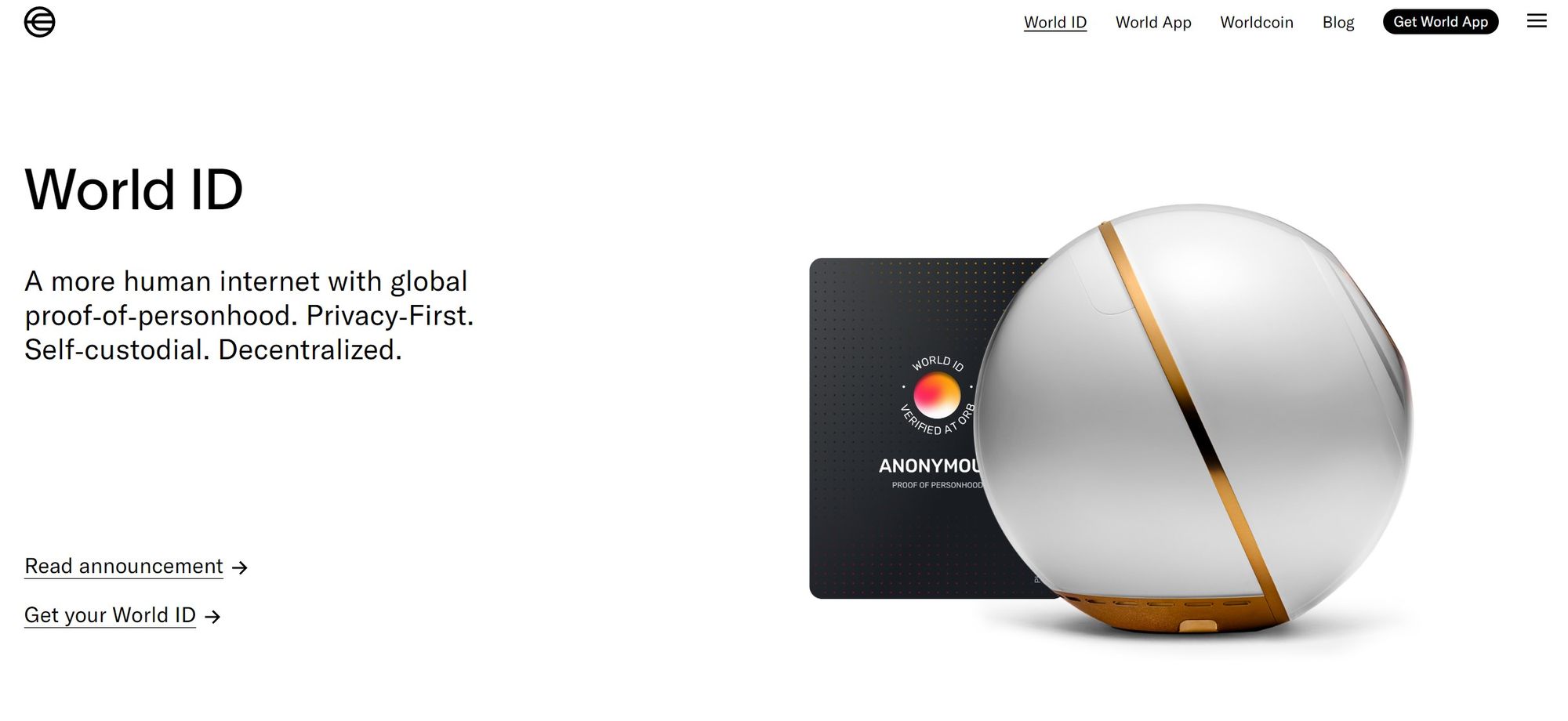
World ID aims to address digital identity using zero-knowledge cryptography.
However, its implementation resembles a worldwide repository of human IDs, acquired through an iris scan in exchange for a seemingly worthless Worldcoin token.
This process connects the data to an individual's financial transactions and is overseen by a centralized non-profit organization responsible for collecting sensitive data for KYC (Know Your Customer) and AML (Anti-Money Laundering) compliance.
One cannot help but question the potential risks and complications that may arise from such structure.
World App
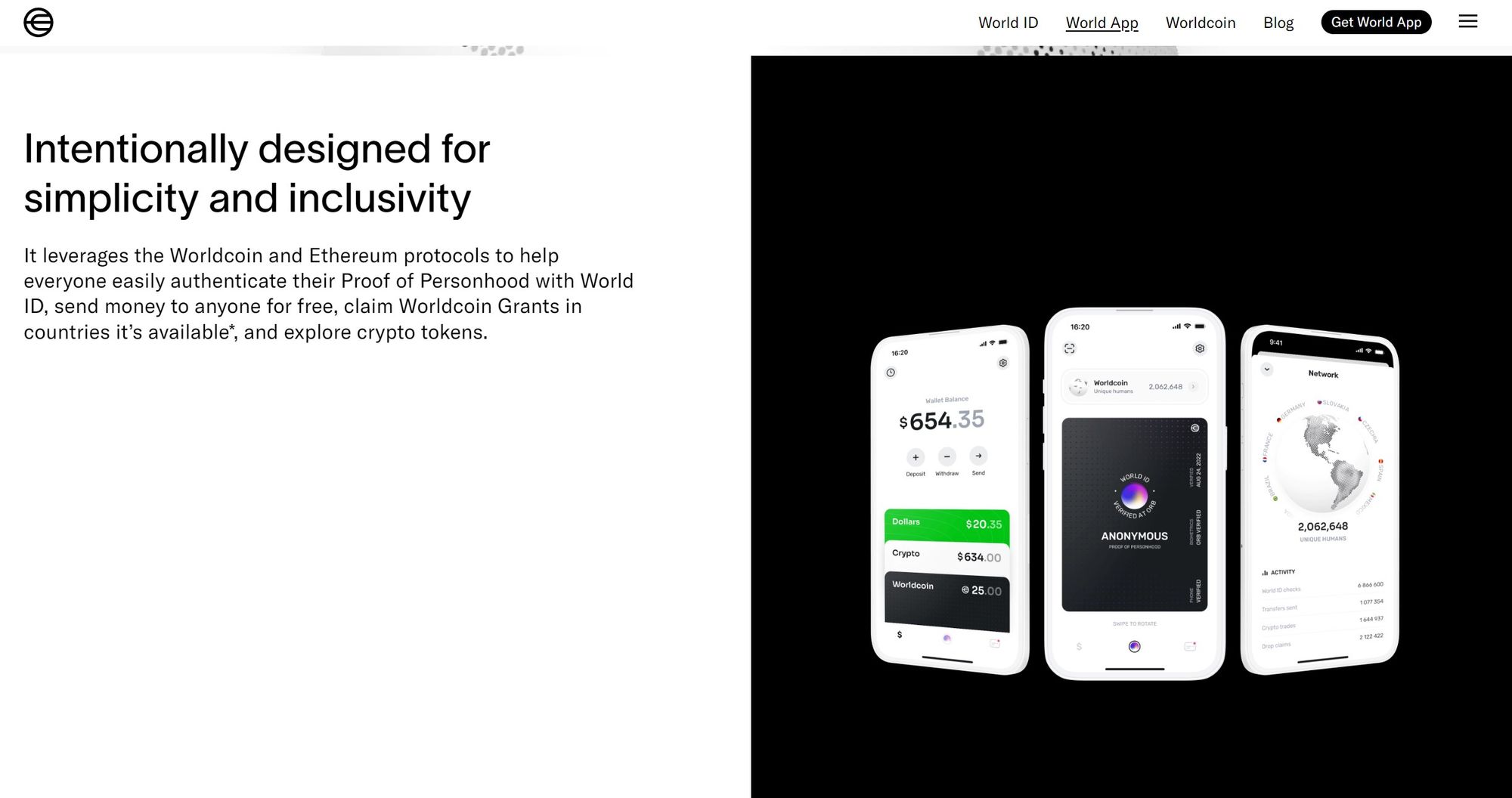
The World App serves as the central application for managing your tokens, World ID, and the entire Worldcoin ecosystem on your devices.
With this app, individuals who have undergone iris scanning can access Worldcoin Grants in eligible countries and explore various crypto tokens.
Moreover, the app features a custodial wallet enabling users to store dollars, cryptocurrencies, and Worldcoin (WLD).
The Token Worldcoin (WLD)
Worldcoin (WLD) is the main pillar of the whole project. It's a digital currency, and the World App acts as the central application for managing tokens, World ID, and the overall Worldcoin ecosystem on users' devices.
Through the app, individuals who have undergone iris scanning can access Worldcoin Grants in eligible countries and explore various crypto tokens. Additionally, the app features a custodial wallet that allows users to securely store dollars, cryptocurrencies, and Worldcoin.
The core assumptions behind Worldcoin are as follows:
- Proof of personhood is considered a crucial digital primitive, particularly as AI models become more advanced.
- Scalable and inclusive proof of personhood enables aligning incentives among network participants, leading to the growth of the Worldcoin network. While Bitcoin is issued to secure its network, Worldcoin is issued to grow its network, with security inherited from Ethereum.
- Custom biometric hardware is considered the most reliable method to issue a global proof of personhood, especially in a time of increasingly powerful AI.
The project's Whitepaper elaborates on the reasoning behind its implementation, the current status, and the roadmap. The issuance of tokens to all network participants is designed to align incentives around network growth, particularly in overcoming the "cold start problem" during the initial stages.
This approach could potentially make Worldcoin (WLD) one of the most widely distributed digital assets.
However, some critics have raised concerns about Worldcoin, citing its ERC-20 token status built on the Ethereum network. Some argue that Worldcoin lacks true decentralization due to its predominantly centralized proof-of-stake structure. Many also consider also the network (Ethereum) to be the origin of various pump and dump scams.
They also point out a significant pre-mine of WLD coins that the project has not been transparent about, citing Securities Law reasons. Additionally, Worldcoin has been promoted using multi-level marketing tactics, primarily targeting individuals in developing countries.
Critics also argue that the project has been artificially pumped by releasing only a small percentage of the total coin supply, leading to an inflated market cap. The fully diluted market cap represents a substantially higher value than the actual market cap due to the small circulated supply currently available for trading, on platforms like Binance.
day 3 of @worldcoin launch, crazy lines around the world. one person getting verified every 8 seconds now. pic.twitter.com/vHRu1sWMT3
— Sam Altman (@sama) July 26, 2023
From the very beginning, there have been reports of long queues at certain Iris scan locations. Currently, eligible and verified users can claim 1 free WLD token per week with no maximum limit. This offer applies uniformly across applicable regions.
However, a concern arises regarding the possibility of individuals attempting to create "fake" irises to be scanned. It remains to be seen how this potential issue will be addressed and prevented.
Worldcoin and Universal Basic Income
Worldcoin aims to provide a Universal Basic Income (UBI) using its WLD crypto. The project's whitepaper proposes to distribute tokens to every living human being, but there are doubts about its long-term sustainability.
To fund the UBI, two possible scenarios are considered: either external funding from sources like an AI Lab or through an inflation rate of up to 1.5%. However, both options have drawbacks. If external funding is used, there might not be a need for WLD tokens, as other cryptocurrencies like Bitcoin could be used for distribution. On the other hand, inflation could devalue WLD tokens over time and push investors towards more stable assets like Bitcoin.
The project's success might hinge on its "proof of humanity" technology, like iris-scanning devices. However, if this technology becomes open-sourced, it could lose its competitive edge, and other payment protocols might adopt it.
In the short term, the project might attract retail investors seeking quick gains, but its long-term sustainability is uncertain. The lack of clear funding sources for the UBI and potential token devaluation could pose challenges for Worldcoin's future success. Investors should be cautious and consider these uncertainties before investing.
Worldcoin Investors
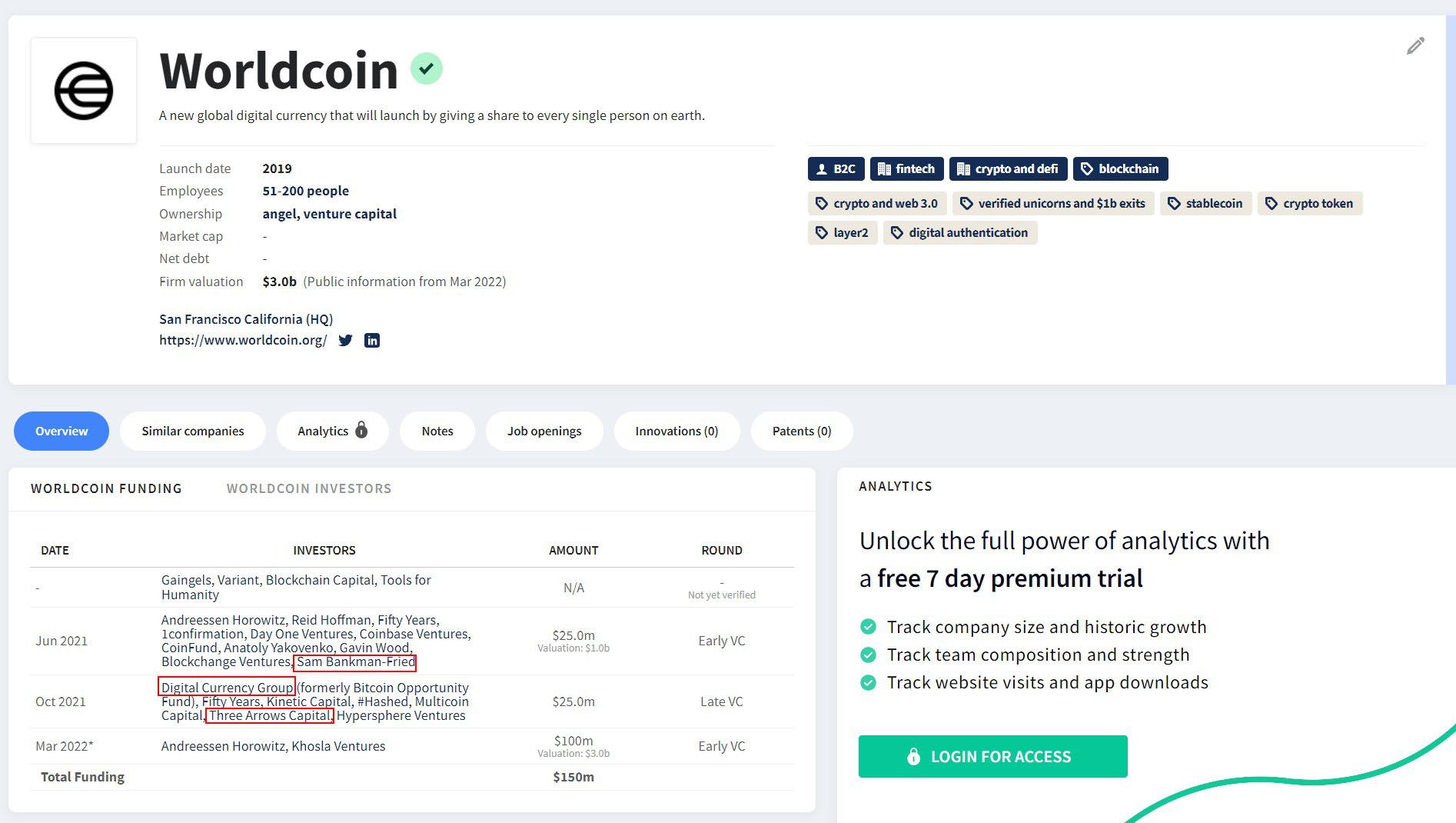
Worldcoin's early investors have garnered significant attention, with some notorious names among them. Notably, Sam Bankman-Fried, infamous for the FTX fiasco that resulted in over $45 billion of investor losses, is among the project's angel investors. The list also includes Three Arrows Capital, which is now bankrupt, and Digital Currency Group (DCG), a deeply troubled crypto giant.
Their presence on the creditors' list has cast doubt on their credibility, leading to widespread speculation. It appears that their investment has already experienced a substantial increase in value, possibly reaching a 20x return. Concerns arise that these investors may choose to sell off their tokens once they become unlocked, considering their bankruptcy status.
The situation has triggered volatile reactions, with Reddit users advising caution and avoiding shorting the tokens due to potential losses. Public opinion on the project has significantly declined, and accusations have been mounting, contributing to a lack of confidence among investors. While some suggestions may be light-hearted, the project continues to face skepticism and apprehension about a potential bank run.
How To Buy Worldcoin (WLD)
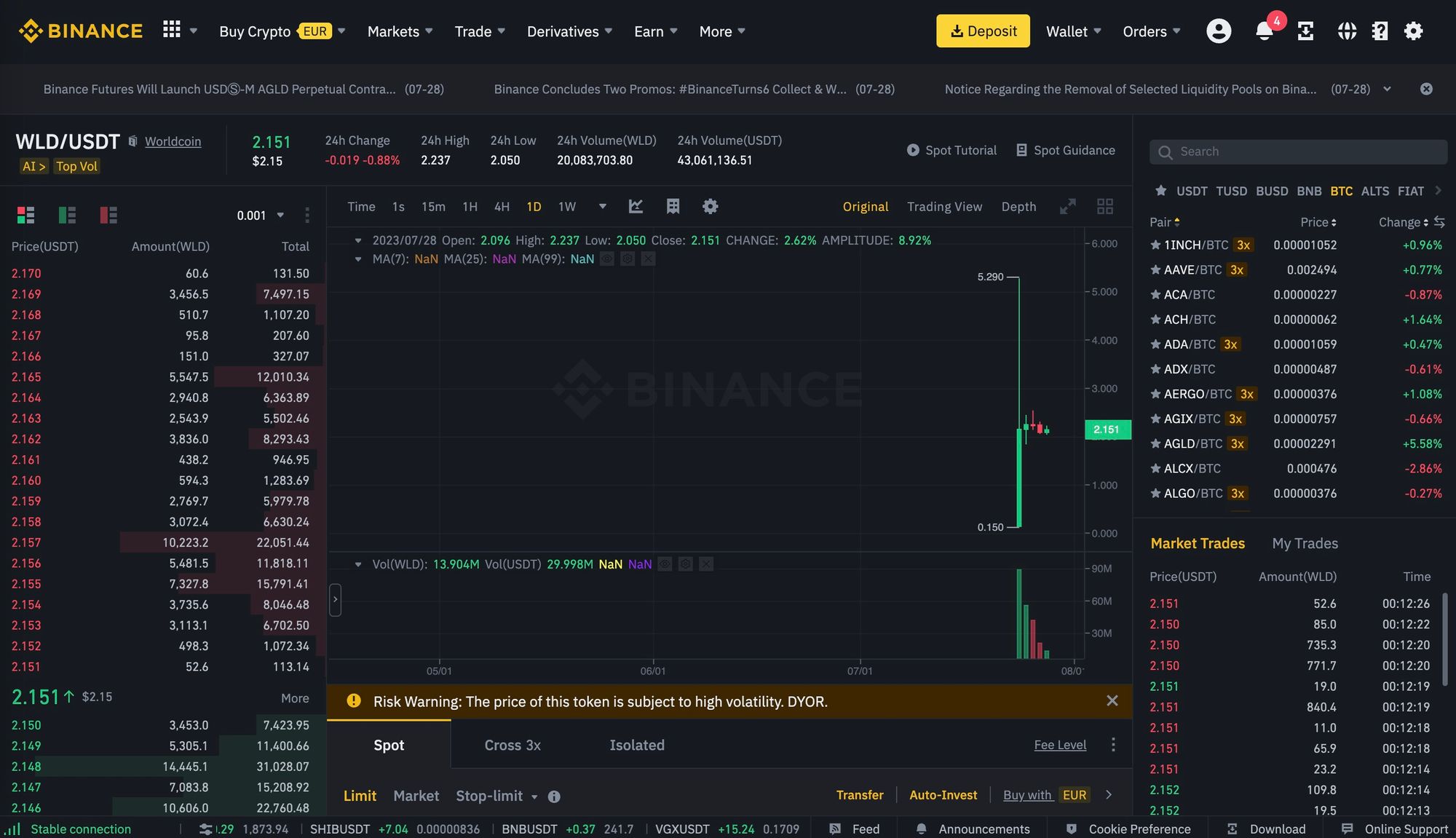
You can buy Worldcoin (WLD) without scanning your iris or fulfilling other requirements requested by the project. The token is available for purchase on exchanges such as Binance.
Step-by-step guide to buying Worldcoin on Binance:
First of all create an account by clicking on the link down here, in this way you will also get a 100 USDT cashback.
👉 Click here to sign up on Binance and get a 100 USDT cashback voucher.
- After registering an account, complete the verification (if required): Depending on your region and the level of trading you intend to do, you may need to complete the necessary verification process on Binance.
- Deposit funds: Deposit the desired amount of funds into your Binance account. You can do this by transferring cryptocurrencies or fiat currencies from your wallet or bank account.
- Navigate to the trading section: Once your funds are available in your Binance account, go to the trading section of the platform.
- Search for Worldcoin (WLD): Use the search bar to find the Worldcoin trading pair (e.g., WLD/USDT).
- Place a buy order: Select the amount of Worldcoin you want to purchase and place a market or limit buy order, depending on your preference.
- Confirm the purchase: Review the details of your buy order and confirm the purchase.
- Monitor your balance: Once the transaction is completed, your purchased Worldcoin will be available in your Binance account's balance.
Please note that you can also sell your WLD tokens for USDT on Binance. Additionally, you have the option to withdraw the funds and transfer them to your hardware wallet linked to Metamask, as Worldcoin is an ERC-20 token.
Worldcoin Pros & Cons
Formulating a pros and cons section for the Worldcoin project is challenging because the cons outweigh the pros significantly. The project is often viewed as a total big brother scenario, given its use of iris scans, which are even more accurate than fingerprints.
I’m still confused as to how a non-profit to which I donated ~$100M somehow became a $30B market cap for-profit. If this is legal, why doesn’t everyone do it?
— Elon Musk (@elonmusk) March 15, 2023
Sam Altman, coming from the OpenAI project, initially sought funds to develop an open-source, non-profit AI system. However, the project later transitioned to a closed-source, for-profit AI technology. Strangely, to address the rise of AI, they created a new cryptocurrency, claiming to solve the problem they themselves contributed to.
While the project advocates for AI regulation, it conveniently excludes its cryptocurrency from any regulatory scrutiny. Although they deny any financial interest in the problem they caused, it's clear that they stand to benefit financially from their cryptocurrency solution.
WLD, the token they introduced, is met with skepticism as it appears to lack a genuine technical solution, especially when existing open-source peer-to-peer identity and messaging protocols like Bitcoin are available. Critics view this behavior as unethical, characteristic of the dubious practices often observed in the venture capital (VC) industry.
| Pros | Cons |
|---|---|
| ❌ Privacy and security risks | |
| ❌ Worldcoin token (WLD) is pre-mined | |
| ❌ Long term sustainability concerns | |
| ❌ People might create "fake" iris to trick the Proof of humanity verification system | |
| ❌ Project's angel investors, Sam Bankman-Fried, was involved with FTX, a crypto exchange that incurred over $45 billion in investor losses |
Bottom Line
It's somewhat ironic that Worldcoin is considered a solution by Sam Altman, who has previously warned about the potential risks of AI leading to humanity's extinction.
On top of that, he is also known as a 'doomsday prepper,' preparing for the very problem that he helped create. In fact, in late 2022, Altman unveiled OpenAI's latest creation, "ChatGPT" to the public, which adds an interesting twist to the situation.
In conclusion, Worldcoin is a cryptocurrency project that aims to provide a Universal Basic Income (UBI) using iris scans for identity verification.
However, it has faced criticism and skepticism due to concerns about its long-term sustainability, lack of technical disruption, and potential centralization. The project's approach and ethical implications have raised doubts among some observers, making it a subject of debate within the crypto community.

